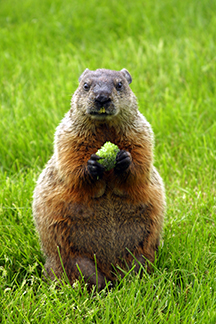 After an unusually cold and snowy winter in central PA, we are all VERY ready for spring...and so is the wildlife that lives around us. While not all animals hibernate during winter, many do hunker down and spend less time out of their den, burrow, or hole when it is cold and wet. And just like people, when the weather begins to warm up, they are ready to get outside. What does that mean for you? Frisky critters with "spring fever" may be out exploring more around your property. While that is not necessarily a problem, make sure not to leave trash or pet food outside to encourage critter visitors. Also be aware that... 1. Several species are having litters this time of year. That makes animal parents much more territorial and potentially aggressive. Educate your children to NOT touch wild baby animals. (REMINDER: You should not touch them either!) 2. Your indoor pets probably have a touch of cabin fever, too. Now that you are able to leave them outdoors for longer periods of time, remember to keep tabs on them if you have seen fox, raccoon, opossum, or other critters hanging around your property. And as always... Assume that any aggressive animal, including those that are naturally bold AND those who are normally shy but acting aggressively, are a danger and health risk to you, your family, and your pets. Hire Daversa Pest Control to safely and humanely remove the animal(s) from your property. Daversa Pest Control is a professional animal removal service. We humanely remove bothersome animals, including raccoon, skunks, foxes, ground hogs, opossums, bats, and other unwanted "critters" from in and around your home or office. We are available 7 days a week, 365 days a year, to help you feel safe. (c) 2014
1 Comment
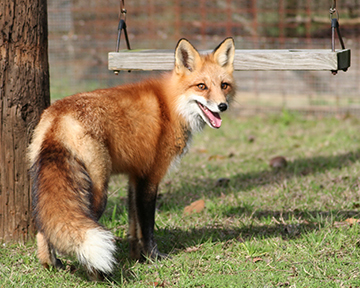 Fox are shy creatures. They are nocturnal. If you are fortunate to see one in the wild, most are beautiful. Fox do not hibernate, so you may see them year-round. So why don't I want one on my property? 1. Fox will eat just about anything that is edible -- small rodents, snakes, rabbits, fruit, garbage, bird seed and pet food. This may become a problem for you if you have penned animals or small pets. Fox will tear into a rabbit and chicken pen. If they can not find food elsewhere, they may become territorial with an outdoor bowl of pet food, or attack your cats or small dogs. Fox may also get into unsecured trash. 2. Fox may become aggressive and territorial when they have a litter. Fox litters are born between late March to early May. During this time, fox may become aggressive to creatures they normally avoid. This could include you, your children, and your pets. And NEVER attempt to pick up a baby fox (kit). If you think the mother has been killed or has abandoned her kits, call the game warden or an animal eviction professional. Do not risk personal injury. 3. As with all wild animals, disease is a consideration. In addition to the risk of rabies, fox can share distemper or mange with your pets. As with rabies, a fox with distemper can become aggressive to people and animals it would normally avoid. Daversa Pest Control is a professional animal removal service. We humanely remove bothersome animals, including raccoon, skunks, foxes, ground hogs, opossums, bats, and other unwanted "critters" from in and around your home or office. We are available 7 days a week, 365 days a year, to help you feel safe. (c) 2014 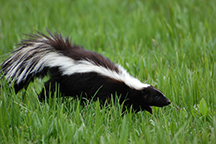 As soon as the weather warms even a little bit, we can expect skunks to come out of hibernation. Skunks can cause more than a smelly problem. They can damage your lawn and landscaping, tear up your trash, and, like all animals, there is the risk they are carrying disease. Skunks are primarily insect eaters. They will dig and tear 3" or larger cone-shaped holes in your turf to get to grubs. They also like grasshoppers, crickets, and beetles. If you have skunks, there are three things you should know: 1. Skunks hate light! If you think you have skunks, install floodlights. That should keep them away. 2. If you or your pets are sprayed, our favorite odor remover is:
Note that:
3. Never try to pick up or remove a skunk yourself. The risk of bite, scratch, or spray is not worth it. Hire a professional! Daversa Pest Control is a professional animal removal service. We humanely remove bothersome animals, including raccoon, skunks, foxes, ground hogs, opossums, bats, and other unwanted "critters" from in and around your home or office. We are available 7 days a week, 365 days a year, to help you feel safe. (c) 2014 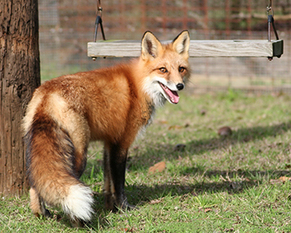 Living near animals is like having new neighbors—you never know what the situation will be until after the new family has already moved in. But unlike the new neighbors next door, you CAN do something about nuisance or problem wildlife. When To Take Action An animal passing through your property is not necessarily a reason for concern, but you do have options if:
Safety Issues A wild animal may pose a safety concern if it is:
Animals that exhibit any of these characteristics may pose a safety risk to you, your children, your pets, or your employees. They should be removed. Health Concerns Wild animals are fun to watch, but if they "move in" they can bring their parasites and diseases with them. Fleas, ticks, worms, and rabies are just a few of the health issues a wild animal can introduce to your family or pets. Evict animals that move in too close to your home. Property Damage That cute raccoon or beautiful fox are fun to watch...until they begin to damage your property. Toppled trash cans, damaged lawn furniture, torn screen doors, and chewed wood are just a few of the not-so-cute things critters can do to your property. Protect Yourself If a nuisance or problem animal is putting your family or property at risk, you have to protect yourself. Have a "critter control specialist" humanely evict your wildlife neighbor before something bad happens. Daversa Pest Control is a professional animal removal service. We humanely remove bothersome animals, including raccoon, skunks, foxes, ground hogs, opossums, bats, and other unwanted "critters" from in and around your home or office. We are available 7 days a week, 365 days a year, to help you feel safe. (c) 2014 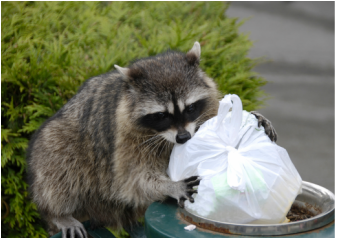 As we end 2013, we are happy to state that rabid animal reports in Pennsylvania continue to decline. At the end of November, the PA Department of Health reported only 329 cases in the Commonwealth year-to-date. See monthly reports here. What is Rabies? Rabies is a deadly virus of the central nervous system, attacking the spinal cord and brain. Rabies can be transmitted to humans from other species, usually through a bite. People bitten by a rabid animal usually will not contract rabies if they promptly receive a post-exposure rabies vaccination. Rabies treatment entails a series of injections. Without treatment, the disease is generally fatal once symptoms appear. Raccoon and Rabies Raccoon's tendency to be curious, social creatures that eat just about anything, make them highly susceptible to contract the disease. Raccoon consistently rank the highest in the number of reported rabies cases both across the U.S and in Pennsylvania. As of November, 145 rabid raccoon were reported in PA. Bats were a distant second on the list with only 74 reported cases. How Do I Know if an Animal is Rabid? You don't. That is why we always recommend pets and their people stay away from wild animals. While some rabid animals exhibit no symptoms at all, aggression is one of the best-known indicators. Wild animals that normally shy away from people, may boldly seek and confront them. What Should I Do if I See a Suspicious Animal?
Daversa Pest Control is a professional animal removal service. We safely remove bothersome animals, including raccoon, skunks, foxes, ground hogs, opossums, bats, and other unwanted "critters" from in and around your home or office. We are available 7 days a week, 365 days a year, to help you feel safe. (c) 2013 |
AuthorAt Daversa Pest Control, we know A LOT about critters you don't want around your home or office. Archives
March 2014
Categories
All
|